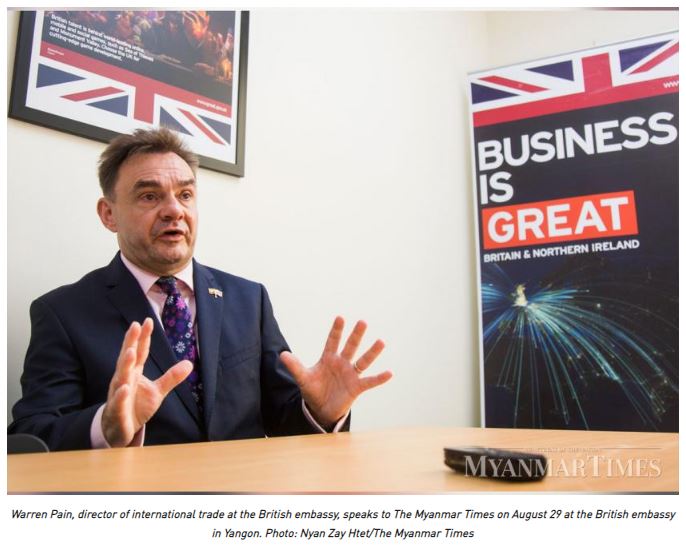UK shifts trade policy on Myanmar to open markets further
Britain is signalling a shift in its trade policy on Myanmar to focus on opening up specific sectors where UK companies already have a foothold, including education, financial and professional services, infrastructure and energy.
In an interview with The Myanmar Times, Warren Pain, director of international trade at the British embassy, set out how the UK is changing its approach, also in the context of its looming divorce from the European Union.
Making its push for further engagement and market liberalisation, the UK has already decided to maintain Myanmar’s tariff-free access, whether or not the EU eventually decides to withdraw such trade privileges because of human rights abuses, as reported by The Myanmar Times.
Addressing serious concerns raised by a UN report last month into crimes against ethnic groups committed by the military and its corporate web, Mr Pain called on UK companies to be “a bit more careful” when doing business in Myanmar but said they should continue to be active in Rakhine state “with caution”.
“We do not think that the recommendations of the report and its thoroughness are such that we need to completely revise our policies and advice to British businesses at the moment. We think that it’s right that the UK government and the DIT [Department for International Trade] continue to support companies which are looking to help work on the economic development of Myanmar,” Mr Pain said.
Recognising economic progress and changes in some sectors, the DIT now focuses more on working for companies already present in emerging sectors, Mr Pain explained. Previously policy was centred on classic trade promotion, such as bringing in trade delegations. While DIT will continue to raise awareness about market opportunities, this will be less of a priority.
“…If the environment develops in the way which we want, we will see more companies coming into Myanmar in their own right without the need for people like us to try and go out and raise awareness of them,” he added.
The DIT is working with Myanmar’s Ministry of Education and the National Education Policy Commission on the draft private sector higher education law with the aim of producing a regulatory framework which will allow for the greatest possible participation for all forms of UK courses.
“For the education sector, that is the fastest moving sector we have at the moment and it’s a very positive sector … It’s a win for British business and it’s a win for Myanmar and your future workforce.”
The bill, which is expected to pass within the next 12 months, will provide provisions on regulations for potential partners for international universities as well as assurances on quality of foreign education courses.
The UK also wants to see more retail market liberalisation, particularly in imports and sales of spirits where DIT is working on a campaign with British drinks companies, Mr Pain said. The earlier opening up of the wine market had a “very positive contribution to consumer experience and government revenue,” he added.
The Ministry of Commerce announced in June it would come up with draft legislation this year to relax the decades-old ban on alcohol imports, which have resulted in massive quantities of foreign alcohol being smuggled into the country. The liberalisation is expected to pave the way for more direct foreign investment and hit the thriving black market.
“Again we see the potential benefits to the Myanmar government of potential increase in tax revenue if liberalisation is implemented correctly. We also see benefits in terms of promotion of responsible drinking,” Mr Pain said.
“I think there’s room for everybody to benefit here,” he went on, arguing that international companies target a different market segment from existing local suppliers.
Observers and business people say restrictions on alcohol imports is a key issue for the new Competition Commission – chaired by the commerce minister – to investigate.
Addressing Brexit, Mr Pain said it was increasingly important for British business to look at opportunities beyond “traditional areas”. ASEAN is a huge and diverse market, he added, and “the one-size-fits-all approach is not the way forward.”
“We need to do a much more thorough job of letting our businesses know what the opportunities are.”
Source: https://www.mmtimes.com/news/uk-shifts-trade-policy-myanmar-open-markets-further.html


 English
English




